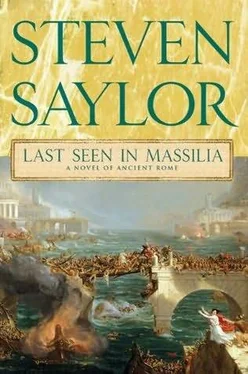Steven Saylor - Last seen in Massilia
Здесь есть возможность читать онлайн «Steven Saylor - Last seen in Massilia» весь текст электронной книги совершенно бесплатно (целиком полную версию без сокращений). В некоторых случаях можно слушать аудио, скачать через торрент в формате fb2 и присутствует краткое содержание. Жанр: Исторический детектив, на английском языке. Описание произведения, (предисловие) а так же отзывы посетителей доступны на портале библиотеки ЛибКат.
- Название:Last seen in Massilia
- Автор:
- Жанр:
- Год:неизвестен
- ISBN:нет данных
- Рейтинг книги:3 / 5. Голосов: 1
-
Избранное:Добавить в избранное
- Отзывы:
-
Ваша оценка:
- 60
- 1
- 2
- 3
- 4
- 5
Last seen in Massilia: краткое содержание, описание и аннотация
Предлагаем к чтению аннотацию, описание, краткое содержание или предисловие (зависит от того, что написал сам автор книги «Last seen in Massilia»). Если вы не нашли необходимую информацию о книге — напишите в комментариях, мы постараемся отыскать её.
Last seen in Massilia — читать онлайн бесплатно полную книгу (весь текст) целиком
Ниже представлен текст книги, разбитый по страницам. Система сохранения места последней прочитанной страницы, позволяет с удобством читать онлайн бесплатно книгу «Last seen in Massilia», без необходимости каждый раз заново искать на чём Вы остановились. Поставьте закладку, и сможете в любой момент перейти на страницу, на которой закончили чтение.
Интервал:
Закладка:
"However you came to be inside the city, it was clearly an ordeal for you both," said Hieronymus, looking us up and down.
"What would comfort you? Food? Wine? Ah, from the look on your faces, I see it's the latter. Come, we shall drink together. And none of the local swill. We'll drink what they drink in Rome. I think I still have some of the good Falernian left."
The house had been built along Roman lines, with a small foyer and an atrium that opened onto the rest of the dwelling. It was a rich man's house, with sumptuously painted walls and a fine mosaic of Neptune (or, since we were in a Greek city, Poseidon) in the atrium pool. Beyond a formal dining room, at the heart of the house, I glimpsed a garden surrounded by a peristyle of red and blue columns.
"Shall we take our wine in the garden?" said Hieronymus. "No, on the rooftop, I think. I love to show off the view."
We followed him up a flight of stairs to a rooftop terrace. Tall trees on either side of the house provided shade and seclusion, but the view toward the sea was clear. The house had been built on the crest of the ridge that ran through the city. Below us the ridge dropped off sharply, so that we looked down on rooftops that descended in steps toward the city walls. Beyond the walls, the sea extended to a horizon of scudding blue clouds. Off to the left, I could see a bit of the harbor and the rugged coastline beyond. Opposite the mouth of the harbor were the islands behind which Caesar's warships lay moored. Shielding my eyes against the lowering sun, I could see one of the ships peeking around the bend of the farthest island. The ship was tiny at such a distance, but the air was so clear I could make out long-shadowed sailors moving about the deck.
Hieronymus followed my gaze. "Yes, there it is, Caesar's navy. They think they're hiding around the bend, but we can see them, can't we? Peek-a-boo!" He fluttered his fingers in a simpering wave and laughed at his own absurdity, as if aware that such childishness was at odds with the lines of ancient suffering that creased his face.
"Were you hereabouts to witness the little naval battle we had a while back? No? It was something to see, I'll tell you. People lined the walls down there to watch, but I had the perfect vantage point right here. Catapults hurling missiles! Fire sweeping the decks! Blood on the water! Nine of our ships lost. Nine out of seventeen-a catastrophe! Some sunk, some captured by Caesar. What a humiliating day for Massilia that was. I can't tell you how much I enjoyed it." He stared grimly at the now placid spot where the battle had taken place, then turned to me and brightened. "But I promised you wine! Here, sit. These chairs are made of imported terebinth. I'm told they shouldn't be left out of doors, but what do I care?"
We sat in the full sunshine. A slave brought wine. I praised the vintage, which was unmistakably Falernian. Hieronymus insisted I drink more. Against my better judgment I did. After his second cup, Davus fell asleep in his chair.
"The poor fellow must be exhausted," said Hieronymus. "We very nearly died today."
"A good thing you didn't, or else I'd be drinking alone."
I looked at him keenly, or as keenly as I could after a third cup of Falernian. So far he had asked not a single question about us-who we were, how we had entered the city, what we had come for. His lack of curiosity was puzzling. Perhaps, I thought, he was merely being patient, biding his time, allowing me to recover my wits.
"Why did you come to our rescue?" I asked.
"Mainly to spite those old men who hang about the market square, the ones who were kicking you and discussing you like a fish that needed gutting."
"Do you know them?"
He smiled ruefully. "Oh, yes, I've known them all my life. When I was a boy, they were men in their prime, very sure of themselves, full of their own importance. Now I'm a man and they're old, with nothing better to do than hang about the square all day, spreading slanders and commenting on everyone's business. The square is shut down now-there's nothing left to buy in the shops-but there they still go, day after day, haunting the place." He smiled. "I like to drop by in the litter every now and then just to taunt them."
"Taunt them?"
"They used to treat me rather badly, you see. The market square was where I used to spend my days, too… when I didn't have a roof over my head. That old coot Calamitos was the worst. He's gotten even crankier since the food shortages began. What a joy to see him so flustered he broke his cane! When I think of the times he struck me with it…
"I don't understand. Who are you? I heard them call you `Scapegoat.' And the old man said he'd report you to the Timouchoi. Who are they?"
He stared grimly at the sea for a long moment, then clapped his hands. "Slave! If I'm to tell the story, and if my new friend Gordianus is to hear it, we shall both require more wine."
VII
"What do you know about Massilia?" asked Hieronymus.
"It's far, far from Rome," I said, feeling a stab of homesickness, thinking of Bethesda and Diana and my house on the Palatine Hill.
"Not far enough!" said Hieronymus. "Caesar and Pompey have a brawl, and Massilia is close enough to take a blow. No, what I mean is, what do you know about the city itself-how it's organized, who runs it?"
"Nothing, really. It's an old Greek colony, isn't it? A city-state. Here since the days of Hannibal."
"Since long before that! Massilia was a bustling seaport when Romulus was living in a hut on the Tiber."
"Ancient history." I shrugged. "I do know that Massilia sided with Rome against Carthage, and the two cities have been allies ever since." I frowned. "I know you don't have a king. I suppose the city's run by some sort of elected body. You Greeks invented democracy, didn't you?"
"Invented it, yes, and quickly discarded it, for the most part. Massilia is run by a timocracy. Do you know what that means?"
"Government by the wealthy." My Greek was coming back to me.
"By, for, and of the wealthy. An aristocracy of money, not birth. Just what you might expect from a city founded by merchants."
"Not a good place to be a poor man," I said.
"No," said Hieronymus darkly. He stared intently into his wine cup. "Massilia is run by the Timouchoi, a body of six hundred members who hold office for life. Openings occur as members die; the Timouchoi themselves nominate and vote on replacement candidates."
"Self-perpetuating." I nodded. "Very insular."
"Oh, yes, within the Timouchoi the attitude is very much `us' and `them,' those on the inside and those on the outside. You see, a man must be wealthy to join the Timouchoi, but it takes more than just money. His family must have held Massilian citizenship for three generations, and he himself must have fathered children. Roots in the past, a stake in the future, and here in the present, a great deal of money."
"Very conservative," I said. "No wonder the Massilian system is so famously admired by Cicero. But is there no people's assembly, as in Rome, where the commoners can make themselves heard? No way for ordinary folk to at least vent their frustrations?"
Hieronymus shook his head. "Massilia is ruled by the Timouchoi alone. Of the six hundred, a rotating Council of Fifteen deal with general administration. Of those fifteen, three are responsible for the day-to-day running of the city. Of those three, one is selected First Timouchos, the closest thing we have to what you Romans call a `consul,' chief executive in times of peace and supreme military commander in times of war. The Timouchoi make the laws, keep order, organize the markets, regulate the banks, run the courts, hire mercenaries, equip the navy. Their grip on the city is absolute." As if to demonstrate, he tightened his fingers around the cup in his hand until his knuckles turned white. The look in his eyes made me shift uneasily.
Читать дальшеИнтервал:
Закладка:
Похожие книги на «Last seen in Massilia»
Представляем Вашему вниманию похожие книги на «Last seen in Massilia» списком для выбора. Мы отобрали схожую по названию и смыслу литературу в надежде предоставить читателям больше вариантов отыскать новые, интересные, ещё непрочитанные произведения.
Обсуждение, отзывы о книге «Last seen in Massilia» и просто собственные мнения читателей. Оставьте ваши комментарии, напишите, что Вы думаете о произведении, его смысле или главных героях. Укажите что конкретно понравилось, а что нет, и почему Вы так считаете.










